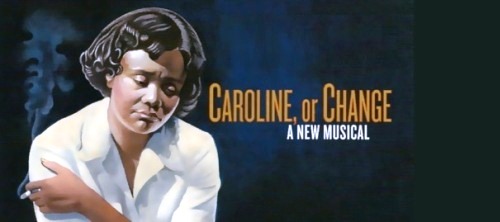The musical is set in 1963 in Lake Charles, Louisiana during the American civil rights movement, November–December 1963, encompassing the time of the assassination of John F. Kennedy.
Caroline Thibodeaux is a black maid for a Jewish family, the Gellmans, spending her days in their dank basement doing the laundry for the pitiful sum of $30 a week. The Gellmans' young son, Noah, has a strong emotional connection to Caroline, a single parent who remains stoic amid the sweep of change she sees around her. Regardless of the circumstances, whether it is the death of a president, her daughter's growing activism and misunderstood dismissal of what she perceives to be Caroline's choice to remain a maid, her son's enlistment in Vietnam, a fight with a newly college-bound friend, or a spin with the dryer, Caroline remains unflappable. She provides stability during Noah's grief at his mother's death from cancer, and her constant anger appeals to his constant sorrow. Noah's new stepmother Rose, unable to give Caroline a raise, enlists Caroline's help in a plan to teach Noah a lesson about leaving change in his pants pocket. Rose tells Noah and Caroline that Caroline should keep the money Noah leaves in his pockets. Caroline loathes the unintended humiliation of taking money from a child—but her own children lack money for toys, sweets, dentistry, and Christmas presents, and she is late with the rent because her salary has gone toward two special meals for her children. As an experiment and while fantasizing to exchange his isolating family for the imagined compassion of hers, Noah deliberately leaves money in his pockets, dreaming that Caroline's family now talk about his generosity over dinner.
The lesson goes awry when the ownership of a $20 bill is contested in the laundry, and Caroline's relationship with eight year-old Noah is irrevocably ruptured. After a week of reflection, with deep regret for harsh words spoken in anger, Caroline decides to return to her dehumanizing work as a maid. In a furious and broken prayer to God, she acknowledges that she'll never escape her circumstances, and she vows to crush her soul so that she can resist the pride that would grant her change but cost her the money that she needs to support her family. Against a background of the death of JFK, the Vietnam war, and the non-violent direct action protests organized by Martin Luther King, the tide of change continues to define Caroline's liminal place in history, a working mother, bearing up under a broken marriage, economic hardship, and racial inequality. Forever a maid, her tragic destiny sears the memories of the two parted principals. The tragedy is ultimately offset by an epilogue, a heroic solo sung by her daughter Emmie, laying claim to the hope and determination for a better life for Caroline's appreciative and proud children.

.png)
.png)





